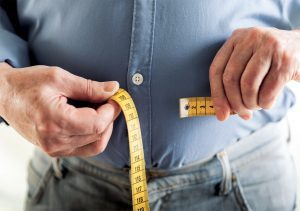By Cederquist Medical Wellness Center
 Research suggests that weight-loss after age 50 could mean additional health benefits. That is if you can keep it off. But why? What makes bodyweight so important, and what is a healthy goal weight for you? Let’s explore.
Research suggests that weight-loss after age 50 could mean additional health benefits. That is if you can keep it off. But why? What makes bodyweight so important, and what is a healthy goal weight for you? Let’s explore.
Bodyweight: The True Meaning
Weight comes up a lot – at the doctor, on supplement commercials, in magazine articles. As frequently as it comes up, many people still don’t understand why weight matters. Well, it means much more than just a number on a scale. Bodyweight is determined by the amount of fat, lean mass, like muscle and bone, and water you carry. Each component makes up a certain percent of your weight. The percentages vary by person, gender and even age. Women generally carry more fat and less muscle than men. Older adults tend to have more fat and less muscle than younger adults. Excess bodyweight (usually in the form of fat mass) is associated with several harmful diseases, including heart disease and diabetes. As we get older, muscle can easily waste away. It also becomes easier to gain fat. Older adults should focus on building muscle and losing body fat.
Ideal bodyweight
Before starting any weight-loss plan, it’s good to set a healthy weight goal. So, what should you aim for? The short answer: it depends on the person. A healthy bodyweight depends on your height and personal preference. The taller a person grows, the more he or she should weigh. Taller people should weigh more than shorter people. Adults should weigh more than children. The weight you feel most comfortable at plays a role too. The National Institutes of Health suggest that a healthy weight for a 5’5” person is between 114 and 149 pounds. You may prefer a more curvy physique. In that case, a heavier weight within the 114 to 149 range may suit you, and that’s ok! A lighter frame closer to 114 is fine too. So long as your weight falls between those two numbers, your disease risk decreases.
Health Benefits of Weight Loss
Getting down to your goal weight would certainly feel amazing. (Talk about a confidence boost!) New research suggests that losing weight after 50 can not only impact your self-esteem but your risk of developing cancer as well.
A recent study found that postmenopausal women over 50 had a decreased risk of cancer if they maintained weight loss over three years or more. Women who did not take hormones and lost more than four pounds were less likely to develop breast cancer later in life. This is compared to women who maintained a stable weight over the study period. The more weight women lost the lower their cancer risk.
In the U.S., about 12% of all women will develop invasive breast cancer. This number has remained fairly steady over the past decade, with more and more women becoming breast cancer survivors. Survivorship gives hope to those who develop the disease. Still, we must do all we can to help prevent cancer altogether. Weight loss may be a strong line of defense against breast cancer.
What Can You Do?
Before starting a weight loss plan, women should first identify a healthy goal weight. Use a height and weight chart to determine your ideal bodyweight. Then, consult with a doctor to confirm that your estimate is suitable for you. Don’t have a doctor? Consider Cederquist Medical Wellness Center. Our dedicated team of physicians and dietitians specialize in weight management. They are here to help with losing weight and keeping the weight off. Give us a call! We can develop a plan just for you, ensuring success and health for years to come.
To learn more, please call our office at 239-977-5058.
As a special gift to help you reach your weight loss goals
Get your FREE Healthy Recipe Guide from the Cederquist Kitchen by calling 239-977-5058!
To Get Immediate Help Call
239-977-5058









